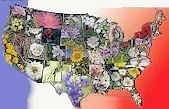
New Mexico Symbols
New Mexico State Flower
Yucca Flower

(Yucca glauca)
Adopted on March 14, 1927.
New Mexico school children labored months on considering the state's flowers. Finally, they favored the yucca, (Yucca glauca.) It was seconded by the New Mexico Federation of Women's Clubs and was officially adopted on March 14, 1927.
Glauca is the Latin word for "greenish-grey." The yucca is a member of the lily family and a symbol of sturdiness as well as beauty. Yucca glauca is a species of perennial evergreen plant, adapted to xeric (dry) growth conditions. It is also known as small soapweed, soapweed yucca, narrowleaf yucca, plains yucca and beargrass. In the early summer, pale ivory flowers bloom at the tips of its long, fibrous stalks.
New Mexico State Flower: Yucca Flower

The yucca is also known as the "Lamparas de dios" which translates to "Lamps of the Lord" due to the bright mass of white flowers that protrude from a center stalk within the plant. The Dakota Indian name for it is Hupestula; Omahas and Poncas call it Duwaduwa-hi; Pawnees know it as Chakida-kahtsuor Chakila-kahtsu. Its needle-sharp leaves have given it the common name, Spanish bayonet.
Also called "soapweed", "beargrass", and "Spanish bayonet", yucca is mostly found south and west of the Missouri River in North Dakota. The plant grows from southeastern Alberta south to Missouri, Texas, and New Mexico at elevations up to 8,500 ft.
The yucca is not only an attractive plant; it is has also been an important resource in past decades as its roots and palm-like leaves provided materials for the making of soap and baskets for those residing in the Southwest. Yucca is included in the agave family (Agavaceae) which contains about 600 species arid regions of the world. Members of this family are noted for the production of fiber (e.g. sisal) and alcoholic drinks (tequila, pulque, and mescal). The genus Yucca contains about 40 species, the most famous being the Joshua tree which reaches 30 feet tall in the Mohave desert.
Characteristics of the Yucca
- Description: Yucca is perennial from a fibrous horizontal or upright stem bearing one or more erect crowns. Acaulescent shrub with
long stiff evergreen leaves radiating from a basal rosette.
- Leaves: Sharp-tipped leaves up to two feet long are rounded on the back and have inrolled margins bearing white filaments. The leaves contain
tough fibers. Flattened or inrolled, stiff, 40-70 cm (16-28 in) long and about 1 cm (0.4 in) wide at base, spiny at apex, glaucous green with greenish
white margins often becoming filiferous.
- Inflorescence: A raceme.
- Flowers: Ten to fifteen flowers form along a spike about three feet long. Flowers are greenish-white and up to 2 1/2 inches long. Numerous,
large, with 3 petaloid sepals and 3 petals, greenish-white or purplish.
- Fruits: At maturity, the large capsules enclose long black seeds. Oblong-cylindrical capsules 4.5-6 cm (1.8-2.4 in) long.
- Root: The root can be several inches in diameter and descend up to 20 feet.
- Habitat: Prefers dry, rocky slopes.
New Mexico House Bill No. 371
House Bill No. 371, naming the "Yucca flower" the "official Flower of the State of New Mexico" was adopted on March 14, 1927.
The legislation does not specify a particular species of yucca flower or even indicate that "all" species are intended to represent New Mexico.
Chapter 102
An Act to Provide For The Adoption of the Yucca Flower As The Official State Flower
H.B. No. 371; Approved March 14, 1927
WHEREAS, New Mexico is in need of a distinctive official flower, and
WHEREAS, the First State Federation of Women's Clubs recommended the Yucca flower as such official flower, and
WHEREAS, the majority of the school children of the state also chose the Yucca flower as the state flower,
NOW, THEREFORE, Be It enacted by the Legislature of The State of New Mexico:
Section 1. The Yucca flower is hereby adopted as the official Flower of the State of New Mexico.
Sec. 2. All Acts or parts of Acts in conflict herewith are hereby repealed.
New Mexico Law
The law designating the yucca flower as the official New Mexico state flower is found in the 2013 New Mexico Statutes, Article 3, Section 12-4-4 A.
Chapter 12 - Miscellaneous Public Affairs Matters
Article 3 - State Seal, Song and Symbols
Section 12-3-4 - State flower; state bird; state tree; state fish; state animal; state vegetables; state gem; state grass; state fossil; state cookie;
state insect; state question; state answer; state nickname; state butterfly; state reptile; state amphibian; state amphibian; state aircraft; state
historic railroad; state tie; state necklace.
Universal Citation: NM Stat § 12-3-4 (2013)
12-3-4. State flower; state bird; state tree; state fish; state animal; state vegetables; state gem; state grass; state fossil; state cookie; state
insect; state question; state answer; state nickname; state butterfly; state reptile; state amphibian; state aircraft; state historic railroad; state
tie; state necklace. (2011)
A. The yucca flower is adopted as the official flower of New Mexico.
B. The chaparral bird, commonly called roadrunner, is adopted as the official bird of New Mexico.
C. The nut pine or pinon tree, scientifically known as Pinus edulis, is adopted as the official tree of New Mexico.
D. The native New Mexico cutthroat trout is adopted as the official fish of New Mexico.
E. The native New Mexico black bear is adopted as the official animal of New Mexico.
F. The chile, the Spanish adaptation of the chilli, and the pinto bean, commonly known as the frijol, are adopted as the official vegetables of New
Mexico.
G. The turquoise is adopted as the official gem of New Mexico.
H. The blue grama grass, scientifically known as Bouteloua gracillis, is adopted as the official grass of New Mexico.
I. The coelophysis is adopted as the official fossil of New Mexico.
J. The bizcochito is adopted as the official cookie of New Mexico.
K. The tarantula hawk wasp, scientifically known as Pepsis formosa, is adopted as the official insect of New Mexico.
L. "Red or green?" is adopted as the official question of New Mexico.
M. "Red and green or Christmas" is adopted as the official answer of New Mexico.
N. "The Land of Enchantment" is adopted as the official nickname of New Mexico.
O. The Sandia hairstreak is adopted as the official butterfly of New Mexico.
P. The New Mexico whiptail lizard, scientifically known as Cnemidophorus neomexicanus, is adopted as the official reptile of New Mexico.
Q. The New Mexico spadefoot toad, scientifically known as Spea multiplicata, is adopted as the official amphibian of New Mexico.
R. The hot air balloon is adopted as the official aircraft of New Mexico.
S. The Cumbres and Toltec scenic railroad is adopted as the official historic railroad of New Mexico.
T. The bolo tie is adopted as the official tie of New Mexico.
U. The Native American squash blossom necklace is adopted as the official necklace of New Mexico.
History: Laws 1927, ch. 102, § 1; C.S. 1929, § 129-101; 1941 Comp., § 3-1303; Laws 1949, ch. 142, § 1; 1953 Comp., § 4-14-3;
Laws 1955, ch. 245, § 1; 1963, ch. 2, § 1; 1965, ch. 20, § 1; 1967, ch. 51, § 1; 1967, ch. 118, § 1; 1973, ch. 95, §
1; 1981, ch. 123, § 1; 1989, ch. 8, § 1; 1989, ch. 154, § 1; 1999, ch. 266, § 1; 1999, ch. 271, § 1; 2003, ch. 182, §
1; 2005, ch. 4, § 1; 2005, ch. 254, § 1; 2007, ch. 10, § 1; 2007, ch. 179, § 1; 2011, ch. 52, § 1.
Taxonomic Hierarchy: Yucca
Kingdom: Plantae - Plants
Subkingdom: Tracheobionta - Vascular plants
Superdivision: Spermatophyta - Seed plants
Division: Magnoliophyta - Flowering plants
Class: Liliopsida - Monocotyledons
Subclass: Liliidae
Order: Liliales
Family: Agavaceae - Century-plant family
Genus:Yucca L. - yucca
State Floral Emblems







